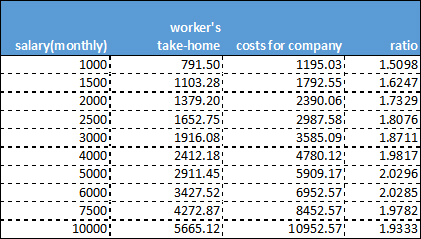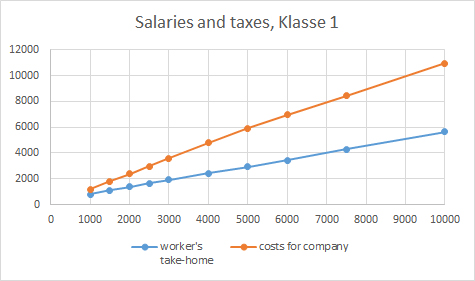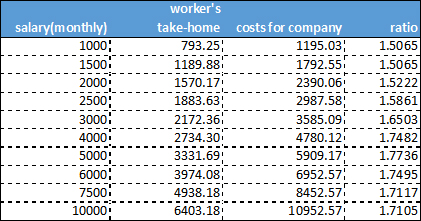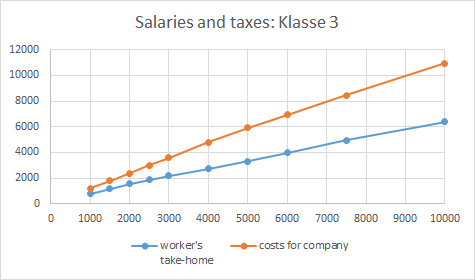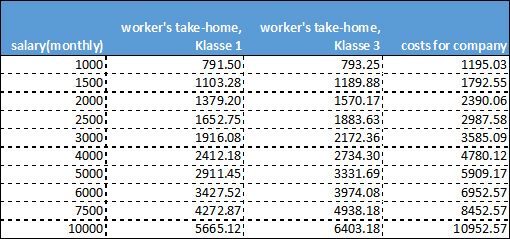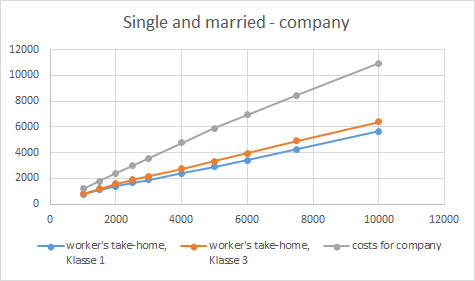Doing business in Berlin VII: Salaries and taxes
Even though we’re talking about entrepreneurship, salaries are an important topic. Firstly because many people are coming to the Berlin startup scene as an employee and not a founder, and secondly because startups should pay according to the standards of the city.
It’s difficult to talk about averages. Technical people are the most highly demanded and are well paid. Especially the ones focused on some special languages and areas, and even more with years of experience. This affects the averages for each group, highlighting men around age 35, that are typically in this group.
Another really valuable profile is people with experience in previous startups, usually the initial employees of companies that have grown fast. They know first-hand the steps and needs of management and are really valuable for ambitious startups. These are also the profiles of “new” founders in the city. A good example of this is ex-employees of Rocket Internet ventures..
I read an interesting report by Jobspotting, and some articles talking about salaries. I’ll summarize the main points.
Usually the first job, excepting internships, is well paid with a significant increase when you get to 2 years experience. Then another small bump for additional experience. The big increase comes when you have 10 years of experience. These positions are really well paid.
For software developers the salary is between 2900€ for beginners to 5000 for seniors.
In sales there’s not a significant gap, starting roughly at 2000 and going up to around 2500. In marketing, 2000 to 3300. In design the starting pay is 2000, and stays around 2500-2700 until the 10th year when it’s around 5000. And for management, you can expect 2500 to 5300, with an average around 3500-4000. More than 80% of workers have a full time employee contract.
The average age of workers is around 30 years old, with the overall majority falling clearly between 20 to 35 (23.6% 20-25, 41% 26-30, 22.6% 31-35). Definitely the “over 35” crowd, like me, are old-timers (at least to be employees). And as expected the gender gap in startups is similar here: 34% female, 66% male.
The employed here don’t have much experience, mostly with less than 5 years (32.8% 0-2 years, 33.1% 3-5 years, 20.1% 6-10, 14% more than 10 years) and more than 80% have a University degree.
The main areas in Berlin are software development 32.6%, marketing 18.7%, product/project management 12.3%, sales 10.9%, logistics 8.9%, design 6.6% and only 4.5% in management.
I found the results of this study to be quite interesting. To read more about it check out the full report. link
Taxes
This is an important topic. Because of social security and benefits, the difference between what the company pays and what workers take home is very high. Nearly two times more for high salaries, whereas Spain is around 1.5 times. Of course it depends on your personal situation, family, kids…. And also if you contribute to a religion, mandatory, for instance, if you’re Catholic.
The following charts show what happens. I created some scenarios to demonstrate some common situations. For this I used an online calculator, you can check it out for a more detailed explanation of the different items you’ll pay for (in German).
Because the figures depend on so many personal factors, I took out religion (which would be an amount equal to 10% of your income tax, and is not optional if you declare it). And some standards for personal health insurance and also standard pension plans.
I also show a column for ratio, highlighting the division of costs for the company in relation to what the worker takes home. It accounts for the difference between how the company feels and how the worker feels.
For the first scenario, we have a single person without kids. This also applies to married people where both are working, and no one depends on the salary of the other one. Officially this is named Klasse1.
The second scenario is for married people, where only one works or has a significant salary. Here is the main difference. Officially this is named Klasse3.
In the following chart, I’m showing how take-home pay can be additionally affected by an individual’s unique situation. Take Klasse 1: this includes singles, and married individuals (where both in the couple are working), and then Klasse 3: married individuals, where one depends on the other’s salary. Here we can see the comparison between these two personal situations. The difference is significant in the individual percentage paid from income, nearly double if you’re single, but not so high compared to the total cost for the company, because of insurance and so on.
Differences between singles and married people both earning money, with or without kids, are irrelevant.
Everything about the system is explained here, albeit in German: Einkommensteuer Wikipedia.
In some of the reports I read, people are discouraged about their salaries. That’s not my personal impression. The people from the industry I talked with are usually happy, and they don’t feel like they’re poorly paid, with one exception, of course, the interns. Spanish people earn a much better salary than in Spain, but also others coming from USA or Europe are ok, maybe because it’s an affordable city. Many are annoyed with the taxes.
Of course everyone will be happier with more money and the magic ticket is to get a London or San Francisco salary with Berlin’s cost of living. But for now that’s just a pipedream.
You can read more in:
Doing business in Berlin I
Doing business in Berlin II: events and networking
Doing business in Berlin III: coworking and accelerators
Doing business in Berlin IV: market and trends
Doing business in Berlin V: Incorporating in Germany
Doing business in Berlin VI: Living here
Doing business in Berlin VII: Salaries and taxes
Doing business in Berlin VIII: Hiring in Berlin (and what to expect if you’re looking for a job)
Doing business in Berlin IX: final thoughts
Brexit: an opportunity for Berlin to grow
